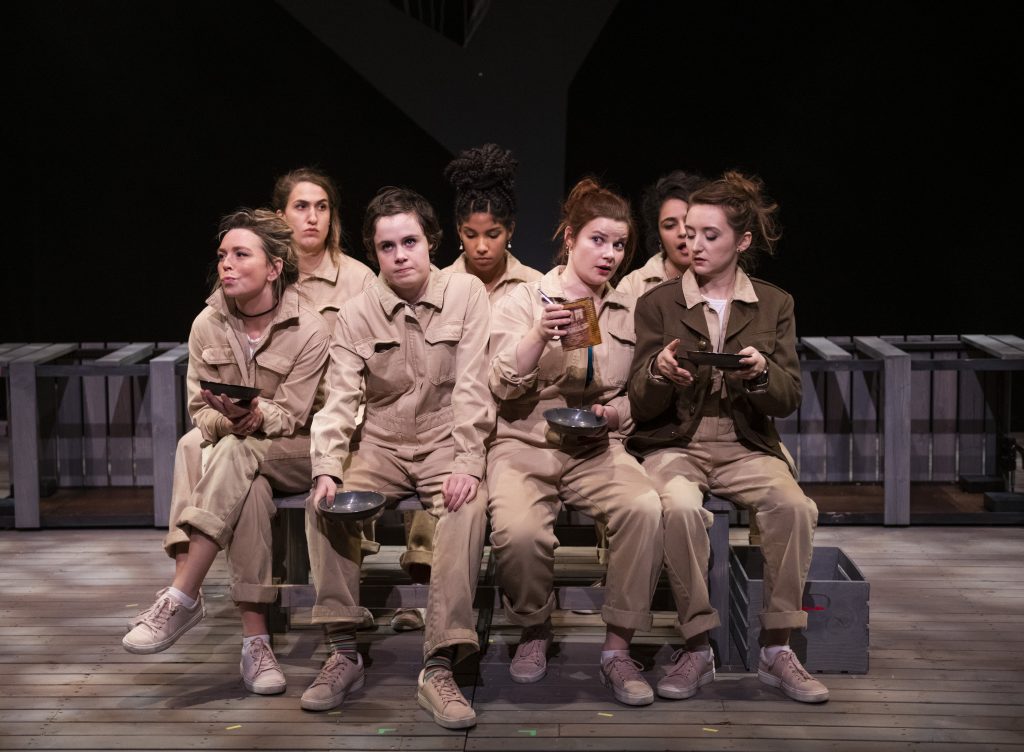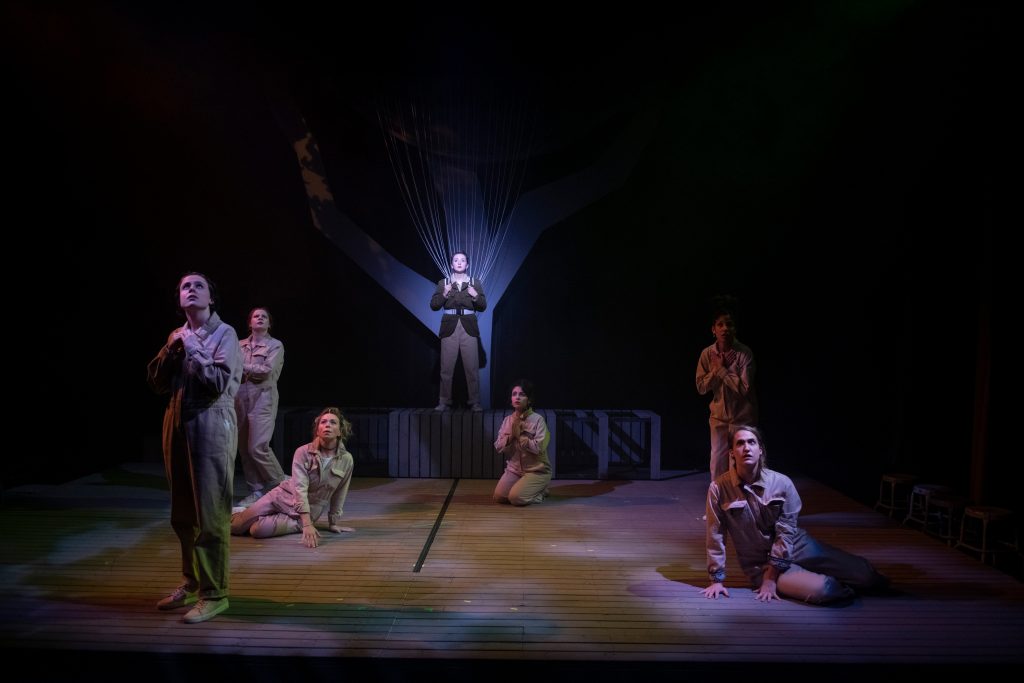
Azarbad. Front row (left to right) – Olivia Hutt, Camille Legg,
Libby Willoughby, Julia Siedlanowska
Credit: Emily Cooper
At The Cultch until November 17, 2018
Tickets from $24 at 604-251-1363 or tickets.thecultch.com
Posted November 9, 2018
It took three years for POWs in Stalag Luft III to build ‘Harry’, one of three tunnels that would lead them from the Nazi camp where they were interned, to freedom. Half a ton of sand had to be dispersed in full view of the well-armed guards; hence, the ‘penguin walk’ with sand drifting down their pant legs onto open ground. The plan was ambitious: two hundred and fifty men were to make a break for it on a moonless night.
Playwright/director Amiel Gladstone’s grandfather was one of those WWII POWs in occupied Poland; the source of Three Winters are his grandfather’s stories and his wartime journal.
The escapade was made into the 1963 fictionalized Hollywood film The Great Escape which was, in turn, based on Paul Brickhill’s first-hand,1950 non-fiction book of the same name.

Credit: Emily Cooper
In Gladstone’s play, under the leadership of Roger everyone had a job to do; tasks were assigned according to skills. Some were assigned to fashion tools out of found objects; others were ‘burrowers’; some made German uniforms out of blankets; and one was a go-between, offering the guards rationed goods like chocolate and coffee (that came in packages from home) in exchange for hard to find items necessary for the escape. There’s the suggestion in the play that in order to get a camera required for forging passports, George offers but doesn’t follow through on the offer of sex.
Not only were the POWs tunneling hour after hour, week after week for three years but they were making theatre thanks to a boxful of scripts donated by the Red Cross: everything from Shakespeare’s Macbeth to S.N. Behrman’s No Time For Comedy. Some of the shows they put on were running at the same time in London’s West End. Woven through Three Winters are fragments of the prisoners’ performances. George has a real flair for the women’s roles – especially Lady Macbeth in her ‘unsex’ me speech. We hear applause, watch the lights go down and see the performers relaxing after the show with a beer or a shot of whiskey and a cigarette.
This is a good place to tell you that Gladstone cast seven young women and no men in Three Winters. In his program notes he writes that this casting encourages audiences “to question their assumptions about who we allow to play what parts and why.” And in his CBC radio interview Gladstone talks about “re-contextualizing” the story. It’s certainly refreshing to have a wartime story enacted by women. But it’s a bit bewildering at the outset: the actors, dressed in army fatigues, are ostensibly men, have men’s names, walk like, talk like, act like men. Does the casting re-contextualize the story? Would young women behave the same way? Would they have enlisted, for starters?

Credit: Emily Cooper
Once the theatrical device is accepted, however, it’s an interesting story. Many who attempted the escape were shot and the war ended days later but one character, too claustrophobic to attempt the tunnel escape, made it back to Toronto after the Allied forces moved into the camp.
Part of the play is about the sustaining effect of making theatre: singing, dancing, storytelling. When prisoners are far from home with little prospect of surviving the war, make-believe can be a powerful force. The balance between the story – primarily Canadian pilot Len’s – and the theme of theatre as a saving grace is a bit off – as if Gladstone could not let either thread go.
But each of the characters is unique and extremely well-executed especially Naomi Vogt as tough, decision-maker Roger; Olivia Hutt as troubled, vulnerable George; Camille Legg as wannabe thespian Arthur and Julia Siedlanowska as Len, shot down in an aircraft woefully inferior to the German planes. Ghazal Azarbad (Charlie), Raylene Harewood (Irving) and Libby Willoughy (Oliver) complete the cast.
Adrian Muir’s set is simple and multifunctional. A long planked box through which the performers tunnel also serves as a makeshift stage and bunks. Jacqueline Firkins outfits all of the performers in overalls and sneakers.
Three Winters is a world premiere and part of The Cultch’s Ceasefire Series. Unlike most POW stories, this is not primarily a story of Nazi brutality – indeed, it is surprisingly civil. As we approach Remembrance Day and the one hundredth anniversary of the end of WWI, it offers a different kind of war story, one that celebrates the power of theatre at the same time.

